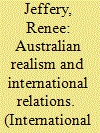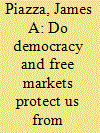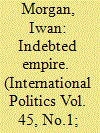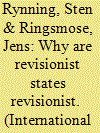|
|
|
Sort Order |
|
|
|
Items / Page
|
|
|
|
|
|
|
| Srl | Item |
| 1 |
ID:
086296


|
|
|
|
|
| Publication |
2008.
|
| Summary/Abstract |
John Anderson, Professor of Philosophy at the University of Sydney from 1927 to 1958, is not conventionally viewed as having exerted a significant influence on the development of international relations in the 20th century. Indeed, his contributions to philosophical realism and public debate in Australian society have been more readily acknowledged as his major spheres of influence. However, Anderson must also be credited with having exerted a significant influence on the intellectual development of one of the most prominent international relations theorists of the 20th century, his student Hedley Bull. With this in mind, this article assesses the impact of Anderson's teachings on Bull's thought and argues that although Bull deviated from his earliest mentor's more extreme views about ethical inquiry, his general approach to the study of international relations, understanding of international society, and sceptical attitude towards religion can, in large part, be derived from Anderson's teachings.
|
|
|
|
|
|
|
|
|
|
|
|
|
|
|
|
| 2 |
ID:
086297


|
|
|
|
|
| Publication |
2008.
|
| Summary/Abstract |
This study empirically tests what has become a central component of US anti-terrorism policy under the Bush administration: that terrorism is a byproduct of illiberal political and economic systems. Employing a series of statistical analyses on incidents of terrorism in 153 countries from 1986 to 2003, the author finds that variables measuring democracy and degree of economic openness are not significant predictors of terrorism. However, the study does find that experience of state failures is significant, thus providing empirical backing for a small, descriptive body of scholarship linking failed states to terrorism.
|
|
|
|
|
|
|
|
|
|
|
|
|
|
|
|
| 3 |
ID:
086298


|
|
|
|
|
| Publication |
2008.
|
| Summary/Abstract |
America is like no other dominant power in modern history because it depends on other countries for capital to sustain its military and economic dominance. The US current-account deficit, comprised primarily of the trade deficit and interest payments on America's external debt to foreign investors, has ballooned since 1997 to reach an annual rate in excess of 6 percent in mid-2005. The US is tied into a co-dependency with Asian countries, which fund its borrowing in order that their export-driven economies have the benefit of competitive exchange rates to sell their goods to Americans. Although some analysts have characterized this relationship as Bretton Woods 2, it is inherently unstable. The US requires Asian countries to continue purchasing massive quantities of dollar reserves but their capacity and need to do so are finite. When Asia stops buying dollars, the American economy will experience problems that will have implications for America's global power. To avert this risk, the US needs to reduce its own governmental budget deficit and promote international agreement for currency and other economic adjustments that can help to rebalance trade flows.
|
|
|
|
|
|
|
|
|
|
|
|
|
|
|
|
| 4 |
ID:
086295


|
|
|
|
|
| Publication |
2008.
|
| Summary/Abstract |
Realists characterize the contemporary international system as a field of competing units of various sizes and capabilities, struggling by means of strategies of self-advancement to achieve goals that are sometimes common, sometimes contradictory. The nation-state is the fundamental unit in the realist constellation of actors. Large and resourceful states can achieve their goals through partnership, influence, alliance, demand, and coercion. Small and less resourceful states find the strategies at their disposal more constrained. Hence small states are encouraged by realist doctrine to pursue strategies of aggregation, coalition-formation, and integration. Thus, realist prescriptions for the small state encourage strategies that run counter to the realist explanation of international dynamics. Are realist policy prescriptions for the small state necessarily anti-realist? This paper addresses this question through an analysis of realist theory with respect to the foreign policy strategies of a small Central Asian state, Kyrgyzstan.
|
|
|
|
|
|
|
|
|
|
|
|
|
|
|
|
| 5 |
ID:
086293


|
|
|
|
|
| Publication |
2008.
|
| Summary/Abstract |
In this article, we argue that Realism recently has eschewed big and important questions of war and peace and that revived Classical Realism can help bring Realism back on track. Modern Realists tend to assume that states are either all status quo players or all revisionists, and the result is a slippery grasp of the sources and dynamics of international change. To revive Classical Realism, we examine three dominant sets of criticism. We notably return to the classical texts of Realism to show that the classics were in fact not reductionist: they did not reduce either systemic or national phenomena (third and second image theory) to human nature (first image). Classical Realists understood the many intricate and delicate connections between these levels, and it is modern era Realists who are reductionists because they reduce explanations to systemic phenomena. We show how Classical Realism can respond in strength to its critics and ask the kind of research questions that again will advance our understanding of international change.
|
|
|
|
|
|
|
|
|
|
|
|
|
|
|
|
| 6 |
ID:
086292


|
|
|
|
|
| Publication |
2008.
|
| Summary/Abstract |
This article notes the just war tradition's difficulty adapting to 21st century warfare, its susceptibility to political appropriation, its lack of conceptual clarity, and its blindness to the gender subordination inherent in its theoretical assumptions. Still, just war theory cannot be discarded - it is a 'necessary evil,' due to both its popularity in political discourse and the necessity of having a framework for ethical analysis of war. This article proposes a feminist reinterpretation of just war theory as the revitalization that just war theory needs. It explains this feminist just war theory based on relational autonomy, political marginality, empathy, and care. It introduces some feminist 'standards' for considering the morality of war. After brief applicatory explorations into the current conflicts in Afghanistan and Iraq, it concludes by arguing that the added normative strength and explanatory power coming from a feminist perspective is something just war theory sorely needs, now more than ever.
|
|
|
|
|
|
|
|
|
|
|
|
|
|
|
|
|
|
|
|
|